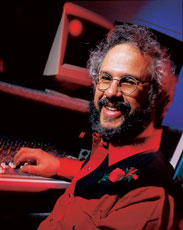By Steve Oppenheimer
(February 2001)
How many times have you heard someone say, “you’re not getting older, you’re getting better”? It’s pure poppycock, of course—the kind of thing someone says when they want to make you feel good about a potentially unpleasant topic. You know good and well that you are getting older; whether you are getting better is another question entirely. Not everyone becomes wiser with age. But you can—if you choose to.
If we don’t get better physically, we can at least improve our strategies and tactics. We can plan more carefully, taking our time and considering the possibilities thoroughly before acting—something we might not have done as often when younger. In short, we can learn to play and work smarter, even if we aren’t brighter. And we can learn patience.
Part of working smarter is setting priorities. What is really important to the job at hand? For instance, when you first became serious about recording, you may have felt that every track had to be absolutely perfect. But do you really need to edit for endless hours? Do you need to worry about every sonic artifact?
Well yes, sometimes. But if your objective is to create music that people will want to buy, your top priorities might be songwriting, arranging, and performing. The recording quality must be good, of course, but the music is the point, not the recording. Besides, often enough, the timbre that doesn’t seem rich enough or the artifact that is driving you nuts will be masked in the mix. Knowing when that is the case—and hence, when you can quit sweating the small stuff—is the result of hard-earned experience. Acting on that knowledge takes good judgment—and that’s what you hope to gain as you get older.
Yet some people keep micro-editing things nobody will ever notice and fearing sonic boogeymen at every turn. As a result, projects take ages to finish. These folks might do well to heed the great American philosopher W.C. Fields: “If at first you don’t succeed, try, try again. Then quit; no used being a damned fool about it.”
No, I don’t mean quit working on the project. Quit obsessing and getting intimidated by the scope of your ambitions. If the problems seem overwhelming, it doesn’t necessarily mean you have to get hung up for an extended period. It might even mean you need to attempt less. Perhaps the arrangements could be sparser. Do you really need to layer and balance ten different sounds in that pad? Maybe, but at least ask yourself the questions.
Remember that you don’t have to make everything perfect. In fact, you can’t: perfection is not an attribute of humans or their works (although some great music comes awfully close). Go back to your first priority: producing the music. Try putting the problem track or piece aside for awhile. Consider changing your basic concept, or find a different way to accomplish your objective.
Like it or not, getting older is unavoidable. Getting better is a matter of choice.
